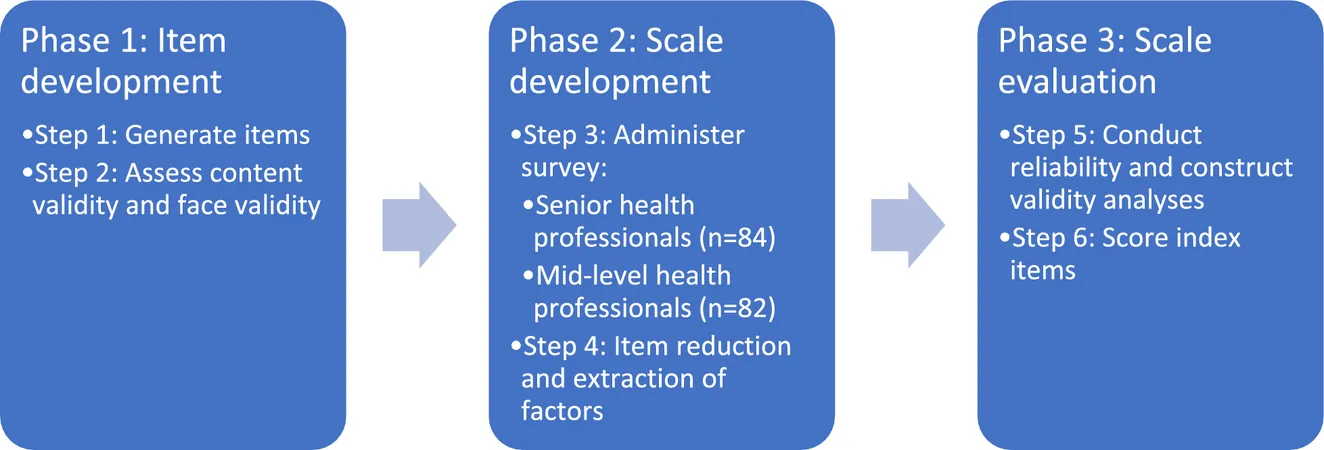
Revolutionizing Public Health in Uttar Pradesh: A New Tool for Competency Assessment
2025-06-23
Author: Sarah
A Game Changer for Public Health in Low-Income Regions
In a quest for Universal Health Coverage (UHC), it's vital for health professionals to acquire the right knowledge, skills, and attitudes. These core competencies are essential for delivering critical public health services, tackling challenges like pandemics and rising disease burdens, especially in low-resource settings such as Uttar Pradesh, India.
Uttar Pradesh's Health Workforce Crisis
Uttar Pradesh, home to nearly 230 million people, faces staggering health workforce issues. With only 22.1 health workers per 10,000 individuals — far below the WHO's standard of 44.5 — the lack of public health training exacerbates the delivery of essential health functions. This disconnect hampers efforts to meet health priorities and manage resources effectively.
Rising to the Challenge: Establishing Core Competencies
Recognizing the urgent need for skilled public health professionals, there have been discussions in India to establish a comprehensive set of core competencies. Initiatives like the Competency Dictionary from the Government of India's Department of Personnel and Training highlight the importance of skills development across various civil service roles.
Introducing a Revolutionary Assessment Tool
Building on existing frameworks, researchers recently developed a new tool to quantitatively measure the core competencies of public health professionals in Uttar Pradesh. This validated tool addresses the competency gaps among healthcare workers by focusing not just on clinical roles but also on public health competencies.
A Robust Research Methodology
The study employed rigorous methodologies outlined in the research literature, covering phases from item development to scale evaluation. Utilizing feedback from local experts and validating the tool through multiple steps, a comprehensive 37-item scale was fashioned.
Insights from the Data: Understanding Competency Levels
Data collected from senior and mid-level health professionals revealed a striking difference in self-assessed competencies. While 68% of mid-level professionals felt knowledgeable in applying public health tools, only 35% of senior professionals shared the same confidence. These disparities illustrate significant areas of improvement for both groups, particularly in financial management and emergency response.
Implications for Future Training and Policy
The COPHEC tool not only highlights current competency levels but also directs future training initiatives. Tailored professional development programs are crucial for addressing the specific needs of different professional levels, ensuring that all health workers are equipped to tackle evolving public health challenges.
The Road Ahead: Future Research Directions
The introduction of the COPHEC tool opens up pathways for enhanced public health competency assessments. Future research plans include calibration through further statistical analysis, comparisons between self-assessments and objective evaluations, and practical applications of competency measurements in licensing and accreditation.
Final Thoughts: A Step Towards a Healthier Future
This groundbreaking study underscores the necessity of developing tailored professional development programs and competency assessments for public health professionals in Uttar Pradesh. By strengthening the workforce, the initiative aims to enhance healthcare delivery and tackle public health issues more effectively, paving the way toward a healthier future for millions.




 Brasil (PT)
Brasil (PT)
 Canada (EN)
Canada (EN)
 Chile (ES)
Chile (ES)
 Česko (CS)
Česko (CS)
 대한민국 (KO)
대한민국 (KO)
 España (ES)
España (ES)
 France (FR)
France (FR)
 Hong Kong (EN)
Hong Kong (EN)
 Italia (IT)
Italia (IT)
 日本 (JA)
日本 (JA)
 Magyarország (HU)
Magyarország (HU)
 Norge (NO)
Norge (NO)
 Polska (PL)
Polska (PL)
 Schweiz (DE)
Schweiz (DE)
 Singapore (EN)
Singapore (EN)
 Sverige (SV)
Sverige (SV)
 Suomi (FI)
Suomi (FI)
 Türkiye (TR)
Türkiye (TR)
 الإمارات العربية المتحدة (AR)
الإمارات العربية المتحدة (AR)